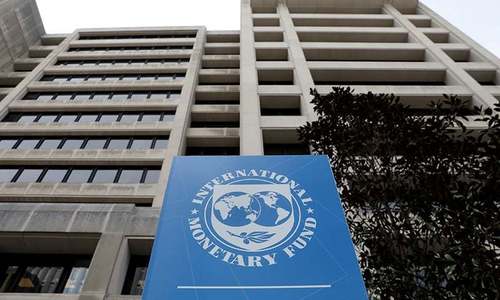• Miftah says Fund going through ‘internal approval processes’
• Insists no more outstanding issues between both sides
ISLAMABAD: From Pakistan’s perspective, talks with the International Monetary Fund (IMF) are complete, and it is just the internal process of the crisis lender, which would come out with a formal announcement on the successful completion of the seventh and eighth quarterly reviews of a stalled loan programme.
“Our talks with the IMF are complete and they are now going through their internal approval process,” Finance Minister Miftah Ismail told Dawn, adding that the announcement should now come from the Fund.
He said the IMF had given the Memorandum of Economic and Fiscal Policies (MEFP) to Islamabad, which had been responded to. “The IMF accepted some of the changes we proposed and did not agree on many others. After discussions, finally, we have given our consent to an MEFP acceptable to the IMF,” he said, adding that there were no more outstanding issues between the two sides.
The IMF’s resident representative in Islamabad, Esther Perez Ruiz did not respond to requests for comment.
Pakistan entered the IMF programme in 2019, but only half the funds have been disbursed to date as Islamabad has struggled to keep targets on track.
The last disbursement was in February and the next tranche was to follow a review in March, but the government of ousted prime minister Imran Khan introduced costly fuel price caps, which threw fiscal targets and the programme off track.
The new coalition government has removed the price caps, with petrol and diesel prices going up by as much as 66pc and 92pc in over a month.
Sources said Pakistan had now accepted, completed or set in motion all conditionalities and prior actions set by the IMF, and some of them would remain under implementation as usual as per the schedule of structural benchmarks.
The authorities expect a formal announcement from the IMF about the staff-level agreement anytime to be followed by its approval by the executive board early next month along with the disbursement of funds.
Read: Up the IMF creek
The sources said the IMF dialogue this time had been tougher than usual and its staff repeatedly raised queries on settled issues. Apparently, Pakistan had become a rolling stone between the policies of the two biggest shareholders — the United States and China.
On June 21, Pakistan’s authorities and the IMF staff mission reached an understanding on the current fiscal year’s federal budget to revive the stalled loan programme after authorities committed to generating Rs436 billion more taxes and gradually increasing the petroleum levy to Rs50 per litre.
As a result, the IMF staff in a statement acknowledged that important progress had been made over the federal budget. Based on this, Pakistan provided written commitment from the provinces to provide Rs750bn in cash surplus to the Centre to contain fiscal deficit within 4.9pc of GDP and help generate a Rs152bn primary fiscal surplus.
Pakistan is now also required to increase the electricity tariff by Rs7.91 per unit besides direct pass-through of monthly fuel cost adjustments in a timely manner.
The revised MEFP is based on budgetary measures approved by the parliament envisaging over Rs1.716 trillion (2.2pc of GDP) of fiscal adjustment, mostly through taxation, including a 10pc super tax on 13 large industries and personal income tax covering monthly incomes above Rs50,000.
This is on top of a fixed tax regime for sectors like retailers, traders, jewellers, builders, restaurants, automobile and property dealers and so on.
This is the biggest fiscal adjustment in a single year that would help turn about Rs1.6tr primary deficit — the difference between revenues and expenditures excluding interest payments — during the current fiscal year into a Rs152bn surplus next year.
Under the structural benchmarks, the government started imposing the petroleum development levy from July 1 at the rate of Rs10 per litre on petrol and Rs5 per litre on high-speed diesel and other products. The levy will now keep going up at the rate of Rs5 per month to a maximum of Rs50.
The electricity rates would be notified to go up by Rs3.50 per unit in July and August each and about Re1 per unit in the September-October billing cycle.
Under the revised MEFP, the 39-month IMF loan programme will be extended by one year to September 2023 and enhanced in size to $7bn instead of the $6bn original size, of which $3bn has been disbursed so far.
Officials said the toughest part of the stabilisation measures had been completed. Pakistan was now out of the default threat but would have to tread a responsible taxation and expenditure path to ensure fiscal and monetary targets throughout the programme period. Any missteps could reverse the hard-earned gains, they said.
While the government had already introduced Rs1.25tr worth of fiscal adjustment in its original budget presented in the National Assembly on June 10, this was not acceptable to the IMF staff. The government then took additional taxation measures of about Rs466bn on June 24 to reach an understanding with the Fund for a bailout necessary in the face of a balance-of-payments crisis.
Published in Dawn, July 14th, 2022













































